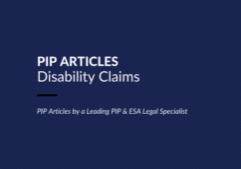PIP and carer’s allowance
This topic relates to two very different benefits, personal independence payment, a disability benefit paid to someone who is severely affected by a disability or illness, and carer’s allowance (CA) which can be paid to someone who provides them with care.
Who can claim carer's allowance?
Let’s take a look at who can claim CA. It is not enough that someone needs looking after and someone looks after them; there are conditions that have to be met by both the person receiving the care and the person providing the care. The person who has the illness or disability must be on a ‘qualifying benefit’, For the purposes of this article, we are talking here about the standard or enhanced rate of the daily living component of PIP. Having an award of even the enhanced rate of the mobility component has no relevance here, so scoring 7 points for daily living but having 12 or more points for mobility will not allow someone to claim carer’s allowance. Other ‘qualifying benefits’ include an award of middle or highest rate disability living allowance (DLA) care component, and either rate of attendance allowance.
That is the only condition attached to the person receiving the care but there are more conditions for the person who is considering claiming CA. They cannot be ‘gainfully employed’, since CA is one of the ‘income replacement benefits’. A carer’s allowance claimant cannot earn more than £132 a week. This figure is correct at the time of writing, in the year April 2022 to April 2023. Earnings up to that amount do not have to be disclosed to the DWP but if it is exceeded, there is no entitlement to CA in that week. There are rules that govern how that weekly income is calculated where actual earnings vary, so get advice from a good source if your situation is other than straight forward.
No upper age limit
You must be at least 16 to claim carer’s allowance but there is now no upper age limit. Also, you cannot be in ‘full-time education’. Whether the course counts as being a full-time one can come down to the hours involved and the mix of ‘supervised study’ and ‘unsupervised study’, so you should not automatically accept that it is full-time because the university describes it as such, and therefore a bar to you receiving carer’s allowance, until you have had specialist advice. The DWP could certainly get this distinction wrong. The benefit will not be paid to a ‘person subject to immigration control’, so it is pretty much restricted to British citizens. You could be in the same family as the person receiving care, or you could be a friend, a neighbour, or you might have no relationship at all.
Entitlement to carer’s allowance
What the care consists of and how much of your time is involved is also relevant. The rules say that the care must be ‘regular and substantial’, defined as 35 hours or more in ‘a week’ (running from Sunday to Saturday). Entitlement to carer’s allowance depends in part on this 35 hour or more condition being met every week, you cannot average it out with more in some weeks making up for weeks in which less than 35 hours of care is provided. The care need not be manual handling or physically helping them though, so that supervising the person, encouraging them and even getting ready for them to arrive and clearing up after their visit counts towards the 35 hours. You might be caring for more than one person, and meet all the requirements for both, but only one lot of carer’s allowance can be claimed (see below for a possible exception).
12 weeks without entitlement
Even though regular and substantial care must be given, the rules do permit breaks from caring of up to 12 weeks without entitlement to carer’s allowance being affected. It will depend on why there is a break, how long the regular care has been in place before the break and time spent in hospital or similar, so get specialist advice.
It is worth remembering that overpayments of benefits, including carer’s allowance, can be recovered where the DWP establish that the rules should not have allowed payment in the first place. Similarly, if the person who has been getting PIP or the other qualifying benefit, no longer has that award, then entitlement to CA also ends. If there was a delay in telling the DWP that the award of the qualifying benefit award had ended, not only would this create a recoverable overpayment, but if the Department consider that you knew but knowingly did nothing, they could bring a criminal prosecution for fraud. The DWP sometimes make decisions that the disability benefit claimant exaggerated their difficulties to get the award. They can end entitlement and decide that the money paid from the start must be repaid. This will often be in addition to bringing a prosecution for fraud. It follows that there should have been no carer’s allowance award. Such cases are rare but get specialist advice if you are affected by such a decision.
Different rules for Scotland
Different rules for carers’ benefits will apply in Scotland. One difference is likely to be that more money can be claimed where more than one disabled child is being cared for, so get advice if you are making a claim as a carer in Scotland.


 Do I still get PIP in a care home?
Do I still get PIP in a care home?